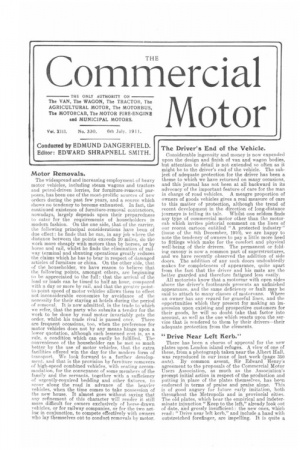"Drive Near Left Herb."
Page 1

Page 2

If you've noticed an error in this article please click here to report it so we can fix it.
There has been a chorus of approval for the new plates upon London island refuges. A view of one of these, from a photograph taken near the Albert Hall, was reproduced in our issue of last week (page 350 ante). By common assent, Sir Edward Henry's agreement to the proposals of the Commercial Motor Users Association, as much as the Association's prompt initial action in respect of the production and putting in place of the plates themselves, has been endorsed in terms of praise and praise alone. This is of good augury for future early imitation, both throughout the Metropolis and in provincial cities. The old plates, which bear the empirical and indeterminate injunction "Keep to the left," already look out of date, and grossly insufficient : the new ones, which read: "Drive near left kerb," and include a hand with outstretched forefinger, are impelling. It is suite a treat, to any student of London traffic, to observe their salutary effect upon road-wasters in the main Kensington highway, and we are glad to know that the Commissioner of Police himself walks that way every morning. He can see the change for himself, and we understand that his superintendents and inspectors bear out the excellent first impression that has been created. May the universal substitution of the old by the new soon become an accomplished fact. There will be fewer delays and—more important still—fewer accidents. Traffic developments render necessary a stricter interpretation and application of the good old rule which has clone service for so many years, and the change is but. one of degree in keeping with that modern necessity. Drivers of slow-moving vehicles, who drive on the crown of any London thoroughfare must, in these days of common user of motors, be fully aware that they frequently are guilty of wilful and negligent obstruction. To plead otherwise is mere obstinacy: it presumes an honest belief that no such things as motorcars or motorcabs exist, and that profession of belief is untenable, Is it not, we ask, a, fair and reasonable construction of police duty to call on them to call to account the selfish driver who incommodes more than half of the travelling public through his own slow-wittedness Z We say that it is.
This new police direction to drivers has received a good start, and it may or may not require further watchfulness on the part of the Commercial Motor Users Association and the Roads Improvement Association, which latter body has cordially supported the former. A change of the kind is in obvious keeping with the spirit of the age, and we feel that it has already won popular approval.




















